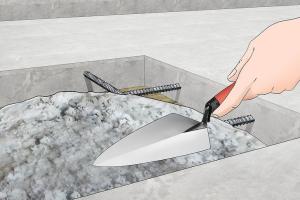Mastering Prepackaged Concrete Mix: A Complete Guide for Homeowners and DIY Enthusiasts

-
Quick Links:
- 1. Introduction
- 2. What is Prepackaged Concrete Mix?
- 3. Benefits of Using Prepackaged Concrete Mix
- 4. Types of Prepackaged Concrete Mix
- 5. Preparation and Tools Needed
- 6. Step-by-Step Guide to Using Prepackaged Concrete Mix
- 7. Common Mistakes to Avoid
- 8. Case Studies and Examples
- 9. Expert Insights
- 10. FAQs
1. Introduction
Prepackaged concrete mix is a convenient and cost-effective solution for homeowners and DIY enthusiasts looking to tackle various projects, from sidewalks to garden planters. This guide will walk you through everything you need to know to successfully use prepackaged concrete mix, ensuring you achieve professional-quality results at home.
2. What is Prepackaged Concrete Mix?
Prepackaged concrete mix, often referred to as ready-mix concrete, is a mixture of cement, aggregates, and additives that is packaged and sold in bags for easy use. This product comes pre-measured, allowing for straightforward mixing and application. It is designed to be mixed with water and can be used for a variety of applications.
3. Benefits of Using Prepackaged Concrete Mix
- Convenience: It saves time as the mix is already prepared.
- Consistency: Ensures uniform quality and performance in your projects.
- Accessibility: Readily available at local home improvement stores.
- Versatility: Suitable for various applications, including repairs, landscaping, and construction.
4. Types of Prepackaged Concrete Mix
There are several types of prepackaged concrete mixes available, including:
- Standard Mix: Ideal for general-purpose applications.
- High-Strength Mix: Formulated for structural applications requiring extra strength.
- Fast-Setting Mix: Dries quickly, making it suitable for projects with time constraints.
- Fiber-Reinforced Mix: Contains fibers that enhance durability and reduce cracking.
5. Preparation and Tools Needed
Before you start mixing concrete, gather the following tools and materials:
- Prepackaged concrete mix
- Clean water
- Mixing container (wheelbarrow or bucket)
- Shovel or hoe for mixing
- Protective gear (gloves, mask, goggles)
- Measuring container for water
6. Step-by-Step Guide to Using Prepackaged Concrete Mix
Step 1: Read the Instructions
Always start by reading the manufacturer's instructions on the bag. Different mixes may require specific water ratios and mixing techniques.
Step 2: Measure the Water
Using a measuring container, pour the recommended amount of water into your mixing container.
Step 3: Add the Concrete Mix
Gradually pour the prepackaged concrete mix into the water. Start with a small amount to avoid overflow.
Step 4: Mix Thoroughly
Use a shovel or hoe to mix the concrete until it reaches a uniform consistency. Aim for a thick, workable paste—neither too dry nor too wet.
Step 5: Pour the Concrete
Once mixed, pour the concrete into your prepared form or area. Use a trowel to spread and level it out if necessary.
Step 6: Finishing Touches
Smooth the surface with a trowel or float, and add any textures or finishes as desired.
Step 7: Curing
Allow the concrete to cure properly by keeping it moist and covered for at least 24-48 hours, depending on the mix type.
7. Common Mistakes to Avoid
- Not following the manufacturer's instructions.
- Using too much or too little water.
- Poorly preparing the mixing area or forms.
- Ignoring weather conditions that could affect curing.
8. Case Studies and Examples
Consider the case of a homeowner in Denver, Colorado, who used prepackaged concrete mix to build a backyard patio. By following the steps outlined above, they successfully created a sturdy and aesthetically pleasing space, showcasing the effectiveness of this product for DIY projects.
9. Expert Insights
Industry professionals recommend that beginners practice mixing small batches of concrete to build confidence and refine their technique. Local workshops or online tutorials can also enhance one’s skills in concrete application.
10. FAQs
1. Can I use prepackaged concrete mix for outdoor projects?
Yes, prepackaged concrete mix is suitable for both indoor and outdoor applications. Ensure you select the right type for your specific needs.
2. How long does it take for prepackaged concrete mix to set?
Setting time varies by product but generally ranges from a few hours to a full day. Always refer to the manufacturer's guidelines.
3. Is it necessary to use a mold when pouring concrete?
While not always necessary, using a mold helps shape the concrete and ensures even thickness.
4. What should I do if I mixed too much concrete?
If you mix too much concrete, you can pour it into a mold to create extra pavers or bricks, ensuring minimal waste.
5. Can I add color to prepackaged concrete mix?
Yes, you can add concrete color pigments available at hardware stores to achieve your desired hue.
6. What tools do I need for mixing prepackaged concrete?
You will need a mixing container, shovel or hoe, measuring container, and protective gear.
7. How do I know if my concrete is mixed properly?
The concrete should achieve a uniform, workable paste—not too dry or watery.
8. Can I use prepackaged concrete mix in cold weather?
Yes, but you may need to use additives to help it cure properly in cold temperatures.
9. What is the best way to cure concrete?
Keep the surface moist and covered for at least 24-48 hours to ensure proper curing.
10. Are there eco-friendly options for prepackaged concrete mixes?
Yes, some brands offer eco-friendly concrete mixes with sustainable materials. Check product labels for certifications.
Random Reads
- The ultimate guide to using microsoft access
- The ultimate guide to syncing fitbit iphone
- How to overclock a cpu
- How to organize your office
- How to make friends with famous people
- How to unlock secure pdf file
- How to unlock sim card iphone
- How to make infinity symbol iphone
- How to power two speakers with one channel amp
- How to reset a master lock